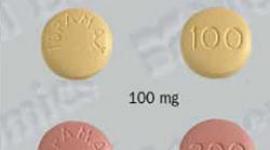Antabuse (Disulfiram) Patient Information
Find out why Antabuse is prescribed, side effects of Antabuse, Antabuse warnings, Antabuse drug interactions, more - in plain English.
Brand name: Antabuse
Generic name: Disulfiram
Pronounced: dye-SULL-fur-am
Category: _ Medication
Antabuse (Disulfiram) Prescribing Information
Patient Information Overview
Important Note: The following information is intended to supplement, not substitute for, the expertise and judgment of your physician, pharmacist or other healthcare professional. It should not be construed to indicate that use of the drug is safe, appropriate, or effective for you. Consult your healthcare professional before using this drug.
WARNING:
Disulfiram must never be given to a patient without their permission, nor to a patient under the influence of alcohol.
USAGE:
This medication is used to help treat alcoholism.
This drug is not a cure for alcoholism and must be used in combination with supportive therapy and counseling.
This medication must never be used without a person's knowledge.
HOW TO USE
Take this medication by mouth, usually one or two tablets daily as directed by your doctor. Tablets can be crushed or mixed with liquid if swallowing is a problem.
Do not take this medication for at least 12 hours after drinking alcohol.
While taking this medication, it is extremely important you avoid alcohol in all forms including beer, wine, aftershave lotions, mouthwash, colognes, liquid medications. Read labels carefully, including those of nonprescription products, and ask your pharmacist about the alcohol content if you are uncertain.
SIDE EFFECTS:
This medication may cause headache, drowsiness, restlessness, skin rash, acne, garlic-like aftertaste, changes in vision. Inform your doctor if any of these effects persist or worsen.
Remember that your doctor has prescribed this medication because the benefit to you is greater than the risk of side effects. Many people using this medication do not have serious side effects.
Unlikely to occur but report immediately: tingling hands or feet, fatigue, weakness, loss of appetite, nausea, vomiting, strong stomach pains, dark urine, yellowing of the eyes or skin.
If you notice other effects not listed above, contact your doctor or pharmacist.
PRECAUTIONS:
Tell your doctor your medical history, especially: heart disease, liver or kidney disease, psychiatric problems, diabetes, any allergies (especially to rubber or pesticides).
This medication causes an intolerance to alcohol. Drinking alcohol while on this medication can cause serious effects that can last from 30 minutes to several hours. It produces an unpleasant reaction of flushing, headache, nausea, vomiting, dizziness, sweating, pounding heart (palpitations), blurred vision or weakness when even small amounts of alcohol are ingested. These disulfiram-alcohol reactions can occur up to two weeks after the medication has been stopped.
Because disulfiram can cause drowsiness, use caution when driving or engaging in activities requiring alertness.
Disulfiram should be used only when clearly needed during pregnancy. Discuss the risks and benefits with your doctor.
It is not known if disulfiram is excreted into breast milk. Consult your doctor before breast-feeding.
DRUG INTERACTIONS:
Disulfiram can affect the way your body reacts to other drugs. Tell your doctor about all the medications you use (both prescription and nonprescription), especially: amitriptyline, isoniazid, metronidazole, theophylline, phenytoin, warfarin.
Do not start or stop any medicine without doctor or pharmacist approval.
OVERDOSE:
If overdose is suspected, contact your local poison control center or emergency room immediately. US residents can call the US national poison hotline at 1-800-222-1222. Canadian residents should call their local poison control center directly. Symptoms of overdose may include unsteadiness, unusual bleeding or bruising, facial flushing, decreased sexual ability, fainting, memory loss, garlic or rotten egg breath, metallic taste, and seizures.
NOTES:
Do not allow anyone else to take this medication.
Laboratory and/or medical tests (e.g., liver function and blood counts) may be performed to monitor your progress.
MISSED DOSE:
If you miss a dose, take as soon as remembered if it is within 12 hours of the missed dose. If it is past 12 hours when you remember, skip the missed dose and resume your usual dosing schedule. Do not double the dose to catch up.
STORAGE:
Store at room temperature between 59 and 86 degrees F (between 15 and 30 degrees C) away from moisture and sunlight. Do not store in the bathroom.
MEDICAL ALERT:
Your condition can cause complications in a medical emergency. For enrollment information call MedicAlert at 1-800-854-1166 (USA), or 1-800-668-1507 (Canada).
Antabuse (Disulfiram) Prescribing Information
Detailed Info on Signs, Symptoms, Causes, Treatments of Addiction
APA Reference
Staff, H.
(2009, January 3). Antabuse (Disulfiram) Patient Information, HealthyPlace. Retrieved
on 2024, November 20 from https://www.healthyplace.com/other-info/psychiatric-medications/antabuse-disulfiram-patient-sheet
